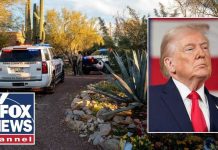
Can the Supreme Court’s decision unlock a new chapter in federal intervention in urban unrest?
Story Overview
- Trump administration seeks Supreme Court approval for National Guard deployment in Chicago.
- Move aims to protect federal personnel and property amid ongoing protests.
- Local judicial resistance poses legal and political challenges.
- The decision could set a precedent for federal intervention in urban areas.
The Trump Administration’s Bold Request
The Trump administration has taken an unprecedented step by pushing the U.S. Supreme Court to authorize the deployment of the National Guard in Chicago. The request comes in response to heightened tensions and protests surrounding immigration enforcement, sparking a debate on federal authority and local jurisdiction. The administration argues that the presence of the National Guard is crucial to safeguard federal personnel and property, which they claim are under imminent threat from the unrest in the city.
This request follows a recent judicial setback where a local judge rejected the initial plea for military intervention. The administration’s persistence in seeking Supreme Court intervention demonstrates its commitment to enforcing federal authority in urban centers, particularly when facing resistance from local governments and courts. This legal maneuver is not just about immediate security concerns; it also raises broader questions about the balance of power between federal and local authorities.
The Legal and Political Implications
Deploying the National Guard in a major city like Chicago without the consent of local authorities raises significant legal and political questions. The administration’s push for Supreme Court approval underscores the complexity of federal intervention in domestic affairs. Historically, the use of federal troops in cities has been limited and often controversial, reflecting the delicate balance between maintaining order and respecting local autonomy.
The legal battle is set against a backdrop of intense political debate over immigration policies and federal enforcement strategies. The outcome of this case could establish a legal precedent for future federal interventions, potentially reshaping the landscape of federal-state relations. The decision will not only impact Chicago but could also influence how similar situations are handled in other cities across the nation.
What’s at Stake for Chicago?
For Chicago, the Supreme Court’s decision could have immediate and long-lasting effects. The deployment of the National Guard might provide the intended security for federal personnel and property, but it could also escalate tensions within the city. The presence of military forces in urban areas is often seen as a heavy-handed approach, which might not sit well with local residents and officials who prefer community-based solutions to address unrest.
Beyond the immediate security concerns, there’s a broader narrative at play regarding how cities manage protests and civil unrest. The outcome of this legal battle will likely influence future strategies and policies for dealing with similar issues, both in Chicago and across the country. As the nation watches closely, the implications of this decision will reverberate far beyond the city’s borders.
Potential Consequences for Federal Intervention
The Trump administration’s request to the Supreme Court has the potential to redefine the scope of federal intervention in urban unrest. If the court grants approval, it could pave the way for increased federal authority in situations where local governments are perceived as unable or unwilling to maintain order. This scenario raises important questions about the role of the federal government in addressing domestic issues and the limits of its power.
For conservatives, the idea of a strong federal response to protect national interests resonates with the principles of law and order. However, it also challenges the conservative tenet of limited government intervention. This case encapsulates a complex intersection of values, where the desire for security and the respect for local autonomy must be carefully balanced. As the Supreme Court deliberates, the nation awaits a decision that could have profound implications for the future of federal intervention in domestic affairs.









